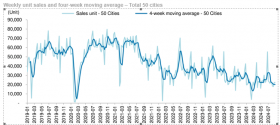Earlier I mentioned that Chinese companies are keeping 500 billion - 2 trillion USD State side due to yuan carry trade. I'm of the opinion that a lot of the export boom in the past years failed to translate into economic benefits domestically because the money isn't repatriated and reinvested in China. Once the interest rate is lowered I expect the economy to get a big stimulus of the best king.
What do you think.
If you have USD offshore in a bank account because you're an exporter, you can command a significant premium by running money laundering offshore for those who want to move cash offshore (of which there are many).
I love how everyone quotes Glenn as if he's just the gospel to explain away all the bad news. He offers a *possible* explanation of the bad news - it is not *necessarily* the correct explanation. Do yourself a favor and not conflate the two - they are not the same.
The entire premise of the "everything is fine" argument seems to be based on a "its a tough year or two we'll get better once we are out of this tough period" - while I'd like that to happen, my question for all of you is - what, specifically, are the changes that will drive the economy out of this 'rut'? Because newsflash, things as they are, have not been improving.
I am not precluding the possibility that they eventually improve in the future, but as of this moment, they are not.
Real Estate sales continue to deteriorate - YoY weekly sales are -22% - Real Estate needs to stabilize (keep in mind 2023 was in general -50% vs 2022 levels) so it has not happened. What will cause this to stabilize? All the policies thus far (relaxation of home purchase restrictions, repurchase of inventory etc) have been punches on cotton - zero effectiveness.
Before anyone talk of 3rd plenum, the notion of using a structural toolkit to solve an immediate, cyclical problem is like telling someone with a heart attack that they should exercise. Like yes they should exercise, but not helpful.

This is the data from Beijing Bureau of the NBS:
Restaurants in Beijing saw profits decline by 89% in 1H24 - they are basically not making money.
From Shanghai:
Retail sales are -2.8% in first 7 months of the year (Jan-March was 0.1% growth) - you do the math on how April-July was (hint: its below -2.8%).
The data has been deteriorating, especially in the past 3 months.
This is the data from industry association for machine tools (supposedly a growing segment of the economy with yuuuuge potential):
Volume up 6.6%, revenues down 3.6. Profits down 15%.
Note, the deflation thus far has not yet translated into lower wages/slower jobs market (which are lagging indicators) - but if you just look up what Boss Zhipin/Liepin say about what they're seeing right now, jobs market is slowing down, even in advanced manufacturing end markets.
For all the 'deflation is great' fanboys, how do incomes of employees go up when revenues are going down? If incomes are going down, how are people going to afford better things?
Debt is nominal, how does the country de-leverage when incomes are not growing?
Also, while I am sympathetic to the argument that China is not underconsuming simply because of the accounting differences / price declines; what this argument implies is that there is, an oversupply of products/services at the current level of consumption (which cause price competition and zero profits).
So which one is it? Is China underconsuming? Or is there an oversupply?
Hint: Politburo already answered it for you -
"要强化行业自律,防止“内卷式”恶性竞争。强化市场优胜劣汰机制,畅通落后低效产能退出渠道。"
Last edited:
